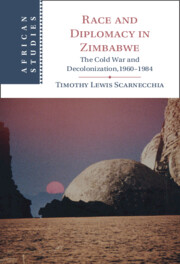Race and Diplomacy in Zimbabwe
The “Rhodesian crisis” of the 1960s and 1970s, and the early 1980s crisis of independent Zimbabwe, can be understood against the background of Cold War historical transformations brought on by, among other things, African decolonization in the 1960s; the failure of American power in Vietnam and the rise of Third World political power at the UN and elsewhere.
In this African history of the diplomacy of decolonization in Zimbabwe, Timothy Lewis Scarnecchia examines the relationship and rivalry between Joshua Nkomo and Robert Mugabe over many years of diplomacy, and how both leaders took advantage of Cold War racialized thinking about what Zimbabwe should be, including Anglo-American preoccupations with keeping whites from leaving after Independence. Based on a wealth of archival source materials, including materials that have recently become available through thirty-year rules in Britain and South Africa, this book uncovers how foreign relations bureaucracies in the United States, Britain, and South Africa created a Cold War “race state” notion of Zimbabwe that permitted them to rationalize Mugabe’s state crimes in return for Cold War loyalty to Western powers.This title is also available as Open Access on Cambridge Core.
Timothy Lewis Scarnecchia is an associate professor of African History and Kent State University in Ohio. He is the author of Urban Roots of Democracy and Political Violence in Zimbabwe: Harare and Highfield, 1940–1964 (2008) and numerous articles on Zimbabwean political history. His research for this book has brought him to work in archives in the United States, Britain, South Africa, and Zimbabwe.
